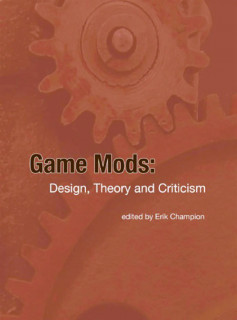Game Mods
Design, Theory and Criticism
Are games worthy of academic attention? Can they be used effectively in the classroom, in the research laboratory, as an innovative design tool, as a persuasive political weapon? Game Mods: Design Theory and Criticism aims to answer these and more questions. It features chapters by authors representing fields as diverse as architecture, ethnography, puppetry, cultural studies, music education, interaction design and industrial design. How can we design, play with and reflect on the contribution of game mods, related tools and techniques, to both game studies and to society as a whole? Are the theoretical issues involved in game mods merely a subset of game design theory, or something else? Should one reference or pay homage to the original game, can a designer display genuine innovation and creativity in the design of a mod? Could the design of game mods, and the design of tools to create game mods, be improved through criticism and theory? Are these toolsets useful and usable in teaching? And can the tools and techniques of game mod design be applied beyond computer games? In the following chapters we touch on many of these issues, but we may well raise more questions than answers.

Imprint
ETC Press
Release Date
January 9, 2013
Pages
200
ISBN
9781300540618
Language
English
DOI / Citations
10.1184/R1/6686762
Product Dimensions
6x9
Total Downloads: 1054
Are games worthy of academic attention? Can they be used effectively in the classroom, in the research laboratory, as an innovative design tool, as a persuasive political weapon? Game Mods: Design Theory and Criticism aims to answer these and more questions. It features chapters by authors chosen from around the world, representing fields as diverse as architecture, ethnography, puppetry, cultural studies, music education, interaction design and industrial design. How can we design, play with and reflect on the contribution of game mods, related tools and techniques, to both game studies and to society?
What is a mod? Mods, short for ‘modifications’, are user- made edits made to PC videogames, the game equivalent of fan fiction. Traditionally free, they range from minor code changes to fix bugs or smoothen gameplay to ‘total conversions’—complete overhauls of art assets to form an entirely new experience.
Game modifications can be artwork, skins (graphic look), tools, total game transformations, new code, or, perhaps less clearly, games ported to other platforms by fans. They can also be homage games, which link back to earlier separate, but thematically-linked game worlds. These are not necessarily mods in a strict sense. The endgame, rather than higher, locked levels, could be the modding itself, to extend and expand the enjoyment of the game. In a similar vein, Scacchi (2010) proposed five types of game mods: user interface customizations, game conversions, machinima and art mods, game computer customization, and game console hacking.
So there are many critical and theoretical and design-related issues lurking beneath the surface of game mods. Critical issues range from how to judge the aesthetic, technical and social values of game mods, to how or even whether one can construct general principles of criticism that can be applied to the judgment of game mods. Would this differ significantly from criticism in game studies? Are the theoretical issues involved in game mods merely a subset of game design theory, or something else? Should one reference or pay homage to the original game, can a designer display genuine innovation and creativity in the design of a mod? Could the design of game mods, and the design of tools to create game mods, be improved through criticism and theory? Are these toolsets useful and usable in teaching? And can the tools and techniques of game mod design be applied in areas beyond computer games?
Publications Category
Books
